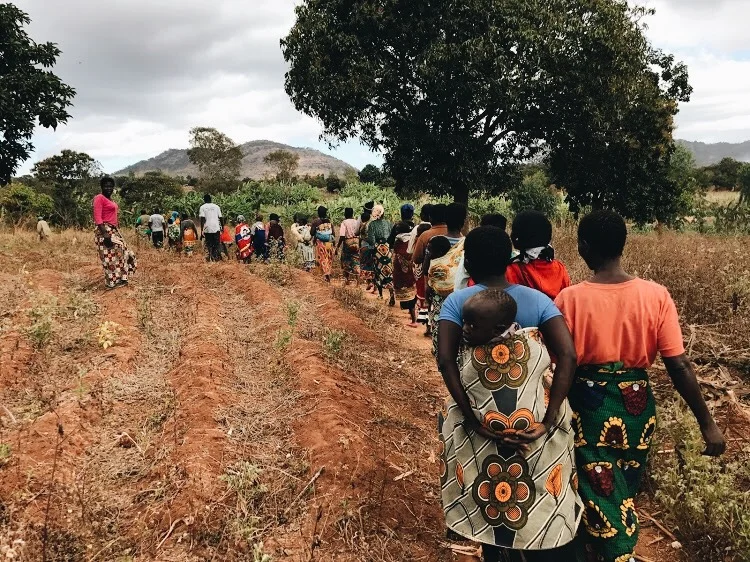A.M.
Today was an early start and off to the Concern office in Mangochi. There, we met the head of the Emergency Livelihoods program, Donald Manda. In a village called Kwitumji, Concern is working to implement the Emergency Livelihoods program. In Kwitumji, there have been numerous droughts and floods for the past two years (since 2015). Emergency Livelihoods is giving money to these households during a time of disaster, in order to help them to get back on their feet. Work in Mangochi began in September of 2016, targeting 11,055 households. Through the program, farmers are encouraged to choose their own seeds, so that they can pick and choose what kinds of crops they wish to grow. By giving cash instead of direct food/items, families become empowered to choose variety, become active members of markets, etc. A few more program details are listed below.
conditional cash transfers: some conditions include,
- Enough capacity/land to grow
- Must apply conservation acts (follow guidelines set by staff and program officers to regulate growing/harvesting, etc.
- Kitchen garden implementation (begin a small garden located near the kitchen area of the house, in order to make it easier while cooking meals with variety)
- Cash is transferred through a G4 Security service, and there are around 10 dissension locations for pick-up.
- Locations are always reasonable distances from the villages (no more than 10km).
- Organization gives aid/fallback if needed during the implementation and process of Emergency Livelihoods.
- $2,211 goes to trust funds and activities
- Families are encouraged to join Village Savings and Loans groups as well
unconditional cash transfer:
- Money is sent and issued the same way as conditional cash transfers
- No fallback is guaranteed during implementation and process of emergency Livelihoods
- Mostly used for extreme poverty areas
While in Mangochi, we also learned about Climate Smart Agriculture. Under the umbrella of climate smart agriculture, falls Conservational Agriculture. Some aspects of Conservational Agriculture include rain harvesting, agroforestry (combining crops/trees in the same soil to provide fertility), and the combination of crops (e.g. growing pigeon peas with maize).
the three principles of Conservational Agriculture:
- Minimal soil disturbance
- Maximum soil coverage
- Crop rotation and location
* Climate smart agriculture enables farmers to make more money off of the little land they have/can grow on.
PROJECT GRADUATION:
While in the field, we learned about a program called Project Graduation. Donald Manda, the project officer, explained to our group what exactly Project Graduation is, and why it is so essential in Malawi. When the program first started in the fall of 2016, 100 households were targeted. Now, and in the next few months, over 980 will be reached. Project Graduation targets households, helping them to "graduate" from poverty. With cash transfers and activities, the Project is directly lifting families out of their current circumstances. Within three years of the program, households should be able to stand on their own. In addition to cash, families are provided with access to micro finance, banks, village savings and loans, etc. Assets are given last, and depend solely on the specific household.
Examples include: expansion of farm/land and starting a business.
Other countries Project Graduation is being implemented in: Haiti, Rwanda, Bangladesh and Malawi. Studies show that after full implementation of the program, the health of children in the household increases, and savings success increases.
P.m.
Today, Steven, Isaac, Karen, and I said goodbye to our driver for the week, Jane. We gave her and Lazarus our school t-shirts, and Cape Cod, Red Sox and Patriots hats too.
Steven, Me, Jane, Lazarus and Isaac after giving them our gifts from the United States :)
Debriefing tonight was emotional, and I don't seem to have words to describe the week quite yet. I am inspired, upset, overwhelmed, determined, and hopeful. I think everyone in the room was feeling about every single emotion tonight. Tomorrow, we are going shopping at the City Mall in Lilongwe, and then will head to the airport to travel home.
Again, today was something new and different from the one before. Tonight, I am thinking about how even the smallest action can have the most tremendous impact. I am feeling blessed for the life I live, and for the opportunities I'm given.
Most importantly, I am feeling thankful to be here in Malawi, surrounded by so much joy and positivity every day.

